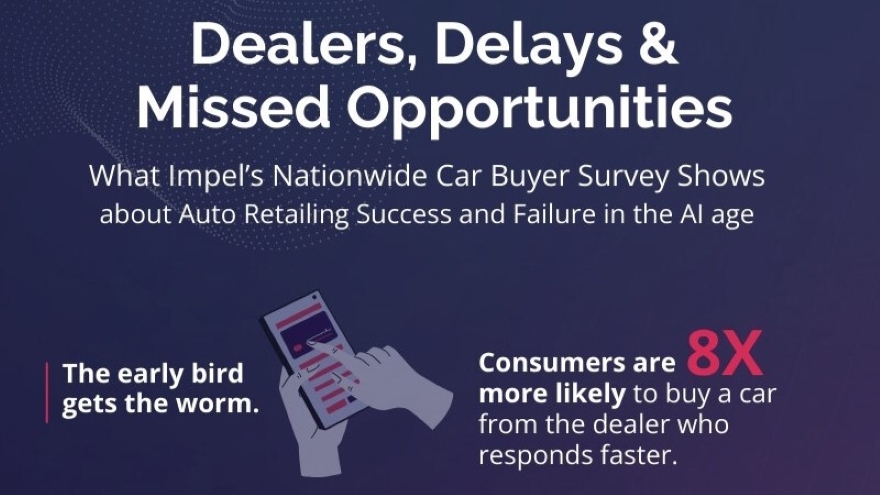Survey: Car shoppers 8 times more likely to buy from fast-responding dealerships

Image courtesy of Impel.
By subscribing, you agree to receive communications from Auto Remarketing and our partners in accordance with our Privacy Policy. We may share your information with select partners and sponsors who may contact you about their products and services. You may unsubscribe at any time.
Car shoppers have questions. Do you have answers? And if you do, how quickly are you getting them to those customers?
A new survey commissioned by customer lifecycle management platform Impel found auto dealers are lagging in responding to inquiries from online car shoppers, affecting customer satisfaction and sales.
Perhaps the most significant finding is that shoppers are more than eight times more likely to buy a car from dealerships that responded faster to their questions.
The online survey of 1,000 U.S. adults who purchased or leased a vehicle from a dealership within the past three years, conducted in August by Pollfish, also showed 49% of recent car buyers said their most recent experience was no better than previous experiences, which Impel said was “driven by significant gaps in dealers’ ability to effectively respond to them.”
What are those gaps?
Well, while 65% of buyers shared their contact information with a dealer, 58% of them said they had to wait more than an hour for a response after submitting that information, and 24% got no response at all from at least one dealership.
Subscribe to Auto Remarketing to stay informed and stay ahead.
By subscribing, you agree to receive communications from Auto Remarketing and our partners in accordance with our Privacy Policy. We may share your information with select partners and sponsors who may contact you about their products and services. You may unsubscribe at any time.
In addition, 45% of shoppers who submitted a question regarding a vehicle said they had to follow up with a dealership that took too long to respond to their questions. And just half of those who received an automated reply were satisfied with it.
“Consumers continue to conduct a significant amount of the car-shopping process online, where competitive alternatives are just a click away,” Impel co-founder and chief strategy officer Michael Quigley said. “It’s clear that answering shopper questions quickly and completely has a significant impact on customer satisfaction and business performance.
“Unfortunately, dealers who continue to run their operations with outdated systems and processes are failing to meet even basic consumer expectations.”
Impel’s findings reinforced many of the issues in dealerships’ response to consumer contacts and question raised by recent mystery-shop studies from EFG Companies and Car Wars.
The survey delved into artificial intelligence’s role in the dealership, asking shoppers about how AI can improve their experience. The most popular answer was reducing paperwork, cited by 39%, followed by cutting down time spent at the dealership (34%) and providing 24/7 availability to answer questions (30%).
Consumers’ concerns about dealership AI included its ability to deliver a personal touch (55%), the accuracy of its information (47%) and whether it can demonstrate an understanding of their needs (25%).
“Relying on human staff, traditional chatbots or basic autoresponders is simply not enough to meet the needs of today’s consumer,” Quigley said. “Many of the shopper frustrations that still exist in the car-buying process, including lack of follow-up and after hours availability, slow response times and impersonal responses to questions, can be directly addressed with generative AI solutions that are available today.
“As more consumers experience first-hand the benefits of interacting with AI-enabled retailers, they will increasingly migrate more of their business and their loyalty to those businesses able to leverage the technology to deliver an enhanced customer experience.”
Other survey findings included:
- 45% of car buyers reported visiting three or more dealer websites, and 49% spent five hours or more conducting online research before their most recent purchase.
- Both digital and physical showrooms play a critical role for consumers – 91% of car buyers visited a dealer website before buying or leasing their last vehicle, while 84% visited a physical showroom to test drive a vehicle before buying and 62% visited two or more dealership locations.


